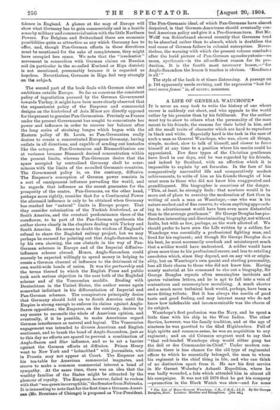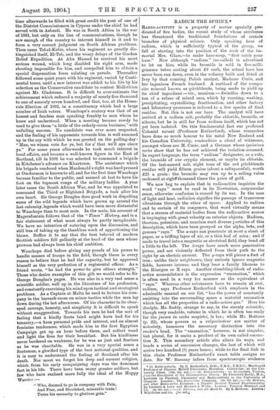IT is never an easy task to write the history
of one whose career is suddenly cut short, and who appeals to the world rather by his promise than by his fulfilment. For the author must try to show to others what the personality of the man meant to his friends, the reasons for their belief in him, and all the small traits of character which are hard to reproduce in black and white. Especially hard is the task in the case of such a man as General Wauchope, who was, above all things, simple, modest, slow to talk of himself, and slower to force himself at any time to a position where his merits could be appreciated. Few finer types of the Christian gentleman have lived in our days, and he was regarded by his friends, and indeed by Scotland, with an affection which it is impossible to explain by set formulas. In the face of his comparatively uneventful life and comparatively modest achievements, to write of him as his friends thought of him must seem to those who did not know him exaggerated and grandiloquent. His biographer is conscious of the danger. "This, at least, he strongly feels; that nowhere would it be more out of place to overstep the moderation of fact than in writing of such a man as Wauchope,—one who was ;33 his nature modest and of fine reserve, to whom anything approach- ing to advertisement would have been even more distasteful than to the average gentleman." Sir George Douglas has pro- duced an interesting and discriminating biography, not without faults, but with as few, perhaps, as the work allowed of. We should prefer to have seen the Life written by a soldier, for Wauchope was essentially a professional fighting man, and lived for his regiment; and though Sir George Douglas do3s his best, he must necessarily overlook and misinterpret much that a soldier would have understood. A soldier would have given more time to his professional career, and less to retailing anecdotes which, since they depend, not on any wit or origin- ality, but on Wauchope's own quaint and sterling personality, lose all their charm to those who did not know him. Having scanty material at his command to eke out a biography, Sir George Douglas repeats often meaningless incidents and quotes valueless letters, and he is apt to fall into a vein of sententious and commonplace moralising. A much shorter and a much more technical book would, perhaps, have been a more fitting tribute. But it has always the merits of good taste and, good feeling, and may interest many who do not know how indefinable and incommunicable was the charm of its subject.
Waucbope's first profession was the Navy, and he spent a little time with his ship in the West Indies. The other Service, however, was the family tradition, and at the age of nineteen he was g-azetted to the 42nd Highlanders. Full of high spirits and common-sense, he was an acquisition to any regiment ; and an old Crimean sergeant used to say that "that red-headed Wauchope chap would either gang tae the dell or dee Commander-in-Chief." Under modern con- ditions there is less chance for the old type of regimental officer to which he essentially belonged, the man to whom his regiment is the chief thing in life, and who can think of no distinction apart from it. He saw his first service in Sir Garnet Wolseley's Ashanti Expedition, where he was badly wounded, a fate which attended him in almost all his campaigns. It was not till 1878 that he got his company —promotion in the Black Watch was slow—and for some
• The Life of Major-General Wauchope, C.B., C.3LG., LL.D. By Sir George Douglas, Bart. London: Hodder and Stoughton. [10e. lid.] time afterwards he filled with great credit the post of one of the District Commissioners in Cyprus under the chief he had served with in Ashanti. He was in South Africa in the war of 1881, but only on the line of communications, though he saw enough of the country to interest himself in it and to form a very correct judgment on South African problems. Then came Tel-el-Kebir, where his regiment so greatly dis- tinguished itself, El-Teb, and the weary delays of the Gordon Relief Expedition. At Abu Hamed he received his most serious wound, which long disabled his right arm, made shooting impossible for him, and compelled him to obtain a special dispensation from saluting on parade. Thereafter followed some quiet years with his regiment, varied by Conti- nental tours, until a new interest was added to his life by his selection as the Conservative candidate to contest Midlothian against Mr. Gladstone. It is difficult to over-estimate the achievement which reduced a majority of nearly five thousand to one of scarcely seven hundred, and that, too, at the Home- rule Election of 1892, in a constituency which had a large number of Irish voters. Wauchope's oratory was that of an honest and fearless man speaking frankly to men whom he knew and understood. When a meeting became rowdy he used to give them "a little of the orderly-room business," with unfailing success. No candidate was ever more respected, and the feeling of his opponents towards him is well summed up in the cry with which he was greeted on the polling-day : "Man, we winna vote for ye, but for a' that we'll aye cheer ye." For some years afterwards he took much interest in local affairs, and became a well-known figure in the East of Scotland, till in 1898 he was selected to command a brigade in Kitchener's advance on Khartoum. The assistance which his brigade rendered when Macdonald's right was hard pressed at Omdurman is known to all, and for the first time Wauchope became familiar to the public, and seemed at last to have his foot on the topmost rungs of the military ladder. A year later came the South African War, and he was appointed to command the Third or Highland Brigade, a task after his own heart. Sir George Douglas does good work in dispelling some of the wild legends which have grown up around the last calamity, legends which would have been more distasteful to Wauchope than to most men. In the main, his account of Magersfontein follows that of the " Times " History, and is a fair statement of what must always be partly inexplicable. We have no intention of entering upon the discussion, and still less of taking up the thankless work of apportioning the blame. Suffice it to say that the best beloved of modern Scottish soldiers fell gallantly at the head of the men whose prowess had always been his chief ambition.
Wauchope died before giving any proofs of his power to handle masses of troops in the field, though there is every reason to believe that he had the capacity, but he approved himself as the very perfection of a regimental officer. As a friend wrote, "he had the power to give others strength." Those who desire examples of this gift we would refer to Sir George Douglas's pages. He was also in a very real sense a scientific soldier, well up in the literature of his profession, and constantly exercising his mind upon tactical and strategical problems. As a Captain at Malta he used to lecture his com- pany in the barrack-room on minor tactics while the men lay down during the hot afternoons. Of his character in its clear- eyed courage, honesty, and simplicity it is difficult to speak without exaggeration. Towards his men he had the sort of feeling that a kindly Scots laird might have had for his tenantry,—a keen personal pride and interest, and an almost feminine tenderness, which made him in the first Egyptian Campaign get up an hour before them, and collect wood and light the fires for their breakfast. But his kindliness never bordered on weakness, for he was as just and fearless as he was charitable. He was in a very special sense a Scotsman, a glorified type of the best national qualities, and it is easy to understand the feeling of Scotland after his death. Nor must we forget his deep and earnest religion, which from his early campaigning days was the dominant fact in his life. There have been many greater soldiers, but few who have realised more fully the ideal of the Happy Warrior :— " Who, doomed to go in company with Pain, And Fear, and Bloodshed, miserable train ! Turns his necessity to glorious gain."



































 Previous page
Previous page